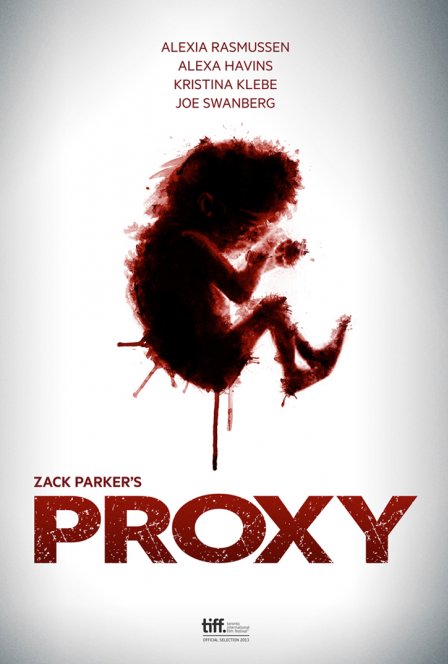Taking its title from the mental disease which leads caregivers to harm the ones they care for, Zack Parker’s latest film is preoccupied with the tragic effects of a person’s disordered need for attention and sympathy. At times uneven and a bit over the top, Proxy nevertheless sustains a level of tension and moody atmospherics (thanks in large part to a Bernard Herrmann inspired score by the Newton Brothers) that call to mind Hitchcock and the best ripoffs of Hitchcock that Brian de Palma used to produce. While Parker and his creative team cannot seem to firm up whether they’re making horror, satire, or social commentary, the overall effect of the film is both jarring and sickly fascinating.
Proxy wastes no time in establishing the brutality of its story, beginning with a particularly graphic depiction of an assault on a young, single, and very pregnant woman (Alexia Rasmussen). Losing her baby after being repeatedly struck with a brick in an alley, and having no family or close relatives of her own to commiserate with, Rasmussen finds solace in a support group for those who’ve lost their children. Parker’s treatment of this period of her life is masterful, and solidifies a somewhat dispassionate tone in his directorial style. While the dialogue that progresses between Rasmussen and a new support group friend (Alexa Havins) tends toward the clinical and unnatural, this ultimately aids Parker in building a somber and creepy mood for his film.
During her time with the support group, and specifically with Havins, we get the feeling that Rasmussen is beginning to see her tragic loss as something of a windfall, gaining the authentic sympathy of another person being a worthy prize for the loss of her unwanted murdered child. Rasmussen’s work in the film is eerie and unsettling, her face almost completely devoid of emotion, acting almost as some kind of sponge for other people’s compassion and attention. After Rasmussen’s girlfriend shows up in the early part of the film it becomes more and more apparent that her problems are pretty dreadful and stem from a larger, older issue than the traumatic loss of her baby. Rasmussen’s decision to play this character in an unsettling, almost completely flat manner contributes an insane amount to the overall creepiness of the first half of the film, and regardless of anything else it’s worth seeing just for her completely odd portrayal of the character.
The film abruptly changes course about halfway through its runtime, a jarring and somewhat perplexing shift that doesn’t seem to pack the kind of theoretical or emotional punch one can only guess the filmmakers were trying to land. Our focus shifts to Havins’s own need for compassion and sympathy from strangers, which naturally manifests itself in another godawful and supremely brutal tragedy. Most interesting in this second, darkly comedic half of the film is Havins’s relationship with her husband (Joe Swanberg), whose barely concealed rage and torment after a tragedy of his own definitely ranks up there with the most intense performance we’ve ever seen from Swanberg. The denouement of the film meanders through some social critique of victim culture and mainstream media, and doesn’t really work when placed alongside the remarkably dispassionate treatment of the preceding action.
An inconsistent voice is what proves to be the weak point in an otherwise very intriguing and beautifully shot movie. Proxy is a creepy film which irks primarily because of that inconsistency: the filmmakers display a need to make a blatant comment about the nature of publicity and the macabre aspects of society to bookend the ostensibly senseless violence and mental disorder that make up the bulk of what’s good in the movie.

